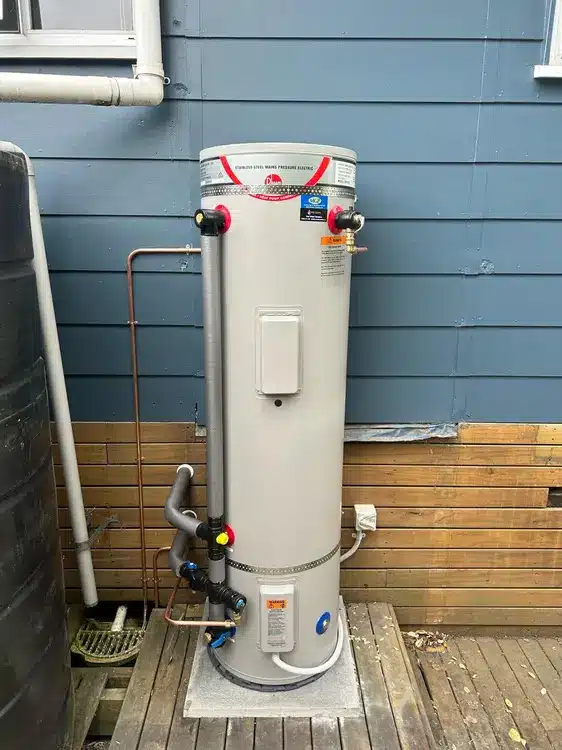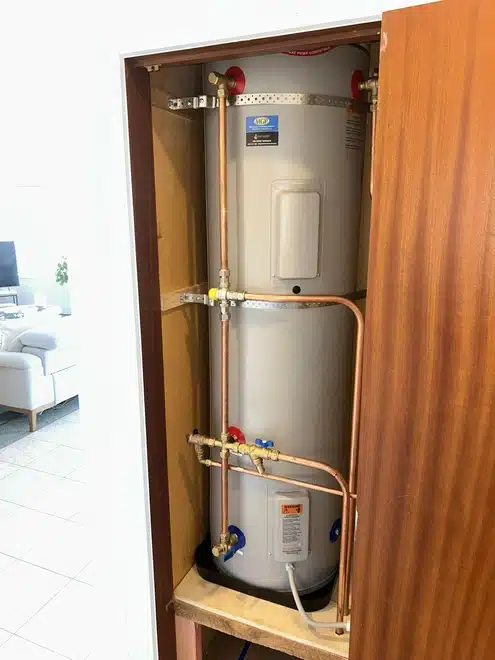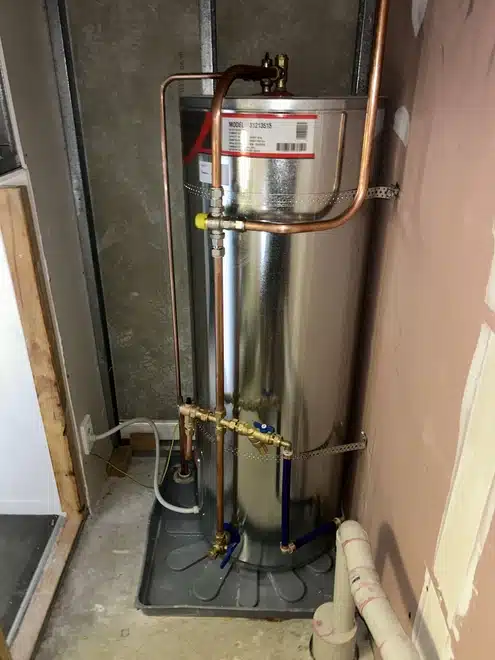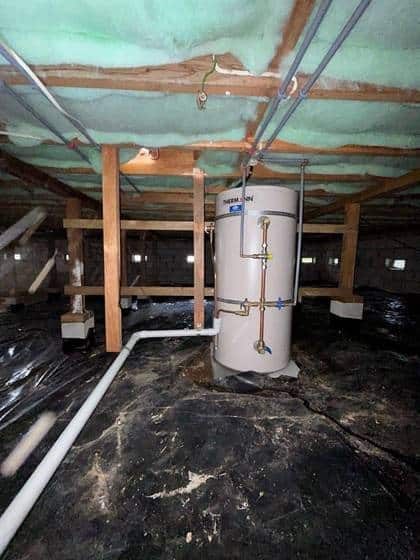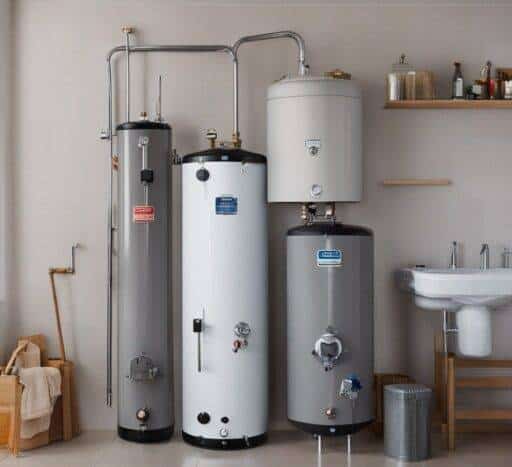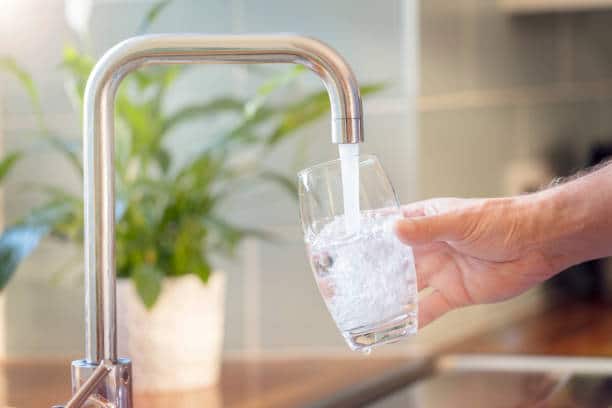What is a Hot Water Cylinder?
A hot water cylinder is a tank for storing hot water for domestic or commercial use. The cylinders can be heated directly by electricity or indirectly by a boiler or renewable heat system. They come in different sizes to suit various household sizes and patterns of water demand. A hot water cylinder is not a boiler, though it is usually paired with one in most systems to provide both central heating and hot water.
Hot Water Cylinder Types Explained
Electrically Heated Water Storage
These systems involve an electric immersion heater within the cylinder for heating water. They’re straightforward, independent units that are frequently used in properties with no boiler. This cylinder type is typical in smaller properties or flats where there’s no gas availability.
Well suited to Wellington and Dunedin households, where electric-only alternatives are more feasible due to building setups or ageing infrastructure.
Boiler-Fed Water Storage (Previously Called Indirect Hot Water Cylinder)
An indirect hot water cylinder is heated by an outside source, typically a gas or oil boiler. A coil inside the cylinder is filled with hot water from the boiler, which in turn warms the surrounding water in the tank. They are more energy efficient, especially when connected to solar thermal panels.
Ideal for larger Auckland or Christchurch homes that already have a boiler as part of a central heating system.
Key Differences: Direct vs. Indirect Cylinders
One of the most common questions homeowners ask is: What’s the difference between a direct and indirect hot water cylinder? Here’s a quick rundown:
| Feature | Electrically Heated Cylinder | Boiler-Fed Cylinder |
|---|---|---|
| Heat Source | Internal immersion heater | External boiler |
| Energy Efficiency | Moderate | Higher, especially with solar |
| Suitable For | Homes without boilers | Homes with central heating |
| Installation | Simple | Requires plumbing and boiler integration |
What Is an Immersion Heater?
An immersion heater is an electric element inserted into the hot water cylinder, where it acts like a large kettle. It can heat water independently of the boiler and can be used as a backup in case the boiler breaks down. Immersion heaters are frequently operated by a timer or thermostat, enabling energy-efficient heating.
A favourite in both urban and rural homes across NZ, immersion heaters offer flexibility, particularly in areas like Rotorua or Nelson, where electric heating can supplement other systems.
Maintain Your Hot Water System
A well-maintained hot water system operates at maximum efficiency. Drain and flush heaters annually to prevent sediment buildup. Check pressure relief valves and consider replacing the anode rod. Insulate pipes to prevent heat loss. Replace very old systems with new efficient ones to gain maximum savings.
Understanding Unvented Hot Water Cylinders
Unvented systems are directly connected to the mains water supply, supplying high pressure to taps, showers, and other outlets. They are closed systems and therefore require safety devices like expansion vessels and pressure release valves. They are more complex and typically require professional installation. They’re ideal for households with multiple bathrooms in cities like Hamilton and Auckland with high water pressure, where water pressure is vital for simultaneous use.
What is a Vented Hot Water Cylinder?
Vented hot water cylinders are fed from a cold water tank (usually in the loft), and they feed water to your taps using gravity. Less complex and cheaper to install, they will generally deliver lower water pressure. Better suited to older houses in cities like Dunedin or Invercargill, where it may not be feasible to retrofit the entire plumbing system.
Choosing the Right Cylinder: Hot Water Cylinder Size Calculators
Getting the right size cylinder is crucial. Too small, and you’ll run out of hot water. Too big, and you’re wasting energy.
Use a hot water cylinder size calculator to determine the ideal capacity based on the number of bedrooms, bathrooms, and simultaneous users. A hot water cylinder sizes chart is also a helpful visual guide to see what standard capacities look like.
Typical Recommendations:
- Hot water tank size for 3 bedroom house: 180 – 210 litres
- Standard hot water cylinder size: 120 – 300 litres depending on property type
- Commercial hot water cylinder size calculator: Takes into account peak usage times, number of users, and required recovery rate.
Hot Water Cylinder Sizes Chart
| Property Type | Number of Occupants | Recommended Cylinder Size |
|---|---|---|
| Apartment | 1–2 | 90–120 litres |
| Small House (2–3 Beds) | 2–4 | 150–210 litres |
| Medium House (3–4 Beds) | 4–6 | 210–300 litres |
| Large House (5+ Beds) | 6+ | 300+ litres |
| Commercial Property | Variable | Custom sizing via calculator |
Central Heating Systems and Hot Water Tanks
A central heating system that includes a hot water tank usually uses a boiler to heat water that is then stored in the cylinder. A central heating system with hot water tank diagram typically shows:
- Boiler (heat source)
- Pump (circulates water)
- Hot water cylinder (stores heated water)
- Radiators or underfloor heating
- Control systems (thermostats, timers)
This configuration allows you to heat water and your home efficiently. It’s particularly beneficial for larger households or commercial spaces in Wellington, where reliable hot water and heating are critical.
Frequently Asked Questions
Is a hot water cylinder a boiler?
No. A hot water cylinder is used to store and provide hot water, and a boiler is the device that is used to heat it. In indirect systems, the water is heated by the boiler and the heat is transferred to the cylinder via a coil or exchanger.
Why do I have a boiler and hot water tank?
If you have both of these, you likely have an indirect system. Your boiler will be heating water for both your heating and your cylinder. This is a more efficient and high-volume hot water supply and is ideal for homes with multiple bathrooms or high demands for hot water.
Commercial Applications in NZ
When it comes to businesses, schools, gyms, and commercial buildings, proper sizing is even more imperative. A commercial hot water cylinder size calculator uses data such as peak usage times, occupancy numbers, and the types of outlets (e.g., sinks, showers) to determine the correct system.
Cities like Christchurch and Tauranga fairly regularly require commercial systems in buildings like hotels and community centres, systems that demand high and reliable performance.
Need Help Choosing? Trust the Experts in Hot Water Cylinder NZ
Finding the right cylinder, size, and setup doesn’t have to be difficult. For expert advice, local service, and professional installation across New Zealand, visit Hot Water Cylinder NZ. They offer tailored recommendations whether you’re in Auckland, Wellington, Christchurch, or anywhere in between.
Final Thoughts
When it comes to heating water efficiently in New Zealand homes and businesses and homes, understanding the types, sizing, and integration possibilities of hot water cylinders is important. Whether you are planning a small apartment renovation or managing a commercial building’s needs, having the right information will save you time, energy, and money.
Looking for top-quality service and support? Trust the team at Hot Water Solutions NZ, they’re your go-to experts for everything from sizing to installation across all NZ cities.

